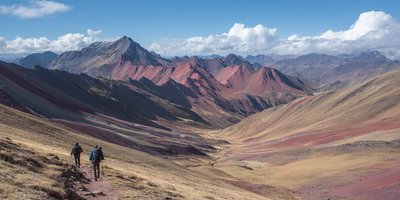
Rainbow Mountain Day Hike: Complete Guide to Vinicunca Trek
Trek to the famous Rainbow Mountain (Vinicunca) and witness Peru's most colorful natural wonder. Complete guide to routes, altitude, logistics and tips.
Found 6 results related to this question
Our monitoring service tracks ticket cancellations and new releases 24/7. Get notified instantly when tickets for your preferred dates become available.
Preparing for the high altitude conditions of the trek to Machu Picchu is essential for a successful and enjoyable experience. Cusco, located at an elevation of 3,400 meters (11,200 feet), is often the first stop for travelers. To acclimatize, consider spending at least two to three days in Cusco before heading to Machu Picchu. This allows your body to adjust to the thinner air.
Stay hydrated, as dehydration can exacerbate symptoms of altitude sickness. Aim to drink at least three liters of water a day, and consider sipping on mate de coca, a traditional Peruvian tea made from coca leaves, known for its natural properties to combat altitude sickness.
Physical preparation is also crucial. Engage in regular cardiovascular activities, such as hiking or running, in the weeks leading up to your trip. This will help improve your stamina and overall fitness.
While trekking, take it slow and listen to your body. If you begin to feel lightheaded or unwell, do not hesitate to stop and rest. Eating light meals that are rich in carbohydrates can help provide energy without taxing your digestive system.
Be sure to pack layers of clothing, as temperatures can fluctuate dramatically between day and night. A lightweight jacket, warm layers, and good trekking shoes will make your journey more comfortable.
Additionally, familiarize yourself with the signs of altitude sickness, which can include headache, nausea, and dizziness. If symptoms persist, consider descending to a lower altitude. Many travelers find that a slow, steady ascent helps mitigate these effects.
Lastly, remember to embrace the cultural aspects of your journey. Interacting with local communities and understanding their traditions can enrich your experience and provide a deeper connection to the land.

Trek to the famous Rainbow Mountain (Vinicunca) and witness Peru's most colorful natural wonder. Complete guide to routes, altitude, logistics and tips.

Learn about the health impacts of high altitude travel in Peru, including altitude sickness symptoms, risk factors, prevention strategies, acclimatization guidelines, and tips for safe trekking.

Everything you need to know about Peru's legendary Huayhuash trek—from distances and passes to highlights, safety tips and preparation.

Embark on the Ausangate Circuit and Rainbow Mountain Trek, where glacial lakes, striped hills and sacred peaks create one of Peru’s most breathtaking hikes.

Experience the Andean way of life on the Lares Trek—a journey through remote villages, hot springs and high passes en route to Machu Picchu.

Explore the remote Vilcabamba region and discover the last refuge of the Inca Empire. Complete trekking guide to this challenging but rewarding adventure.
Set up instant alerts for ticket availability and never miss your chance to visit Machu Picchu.
Get Alerts